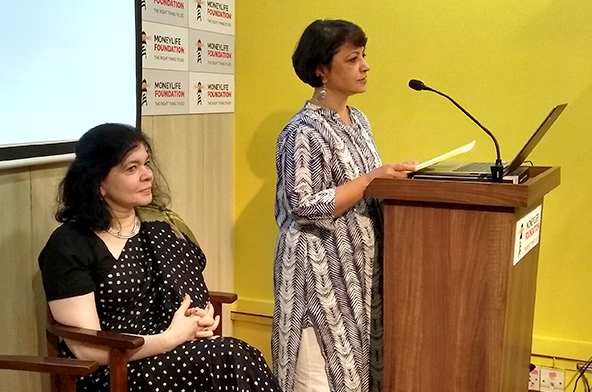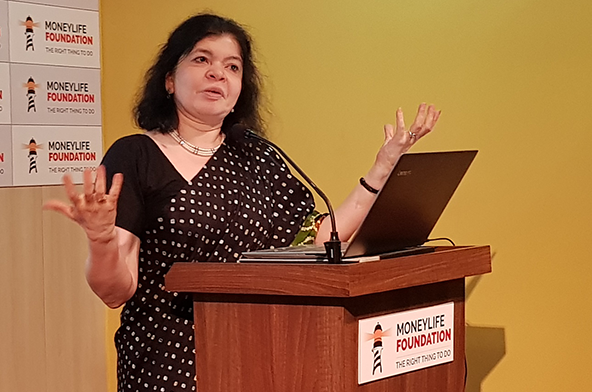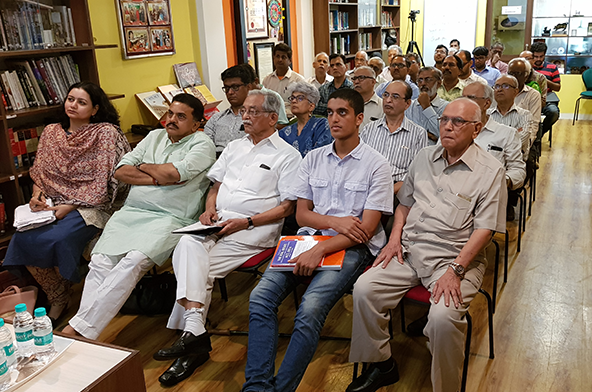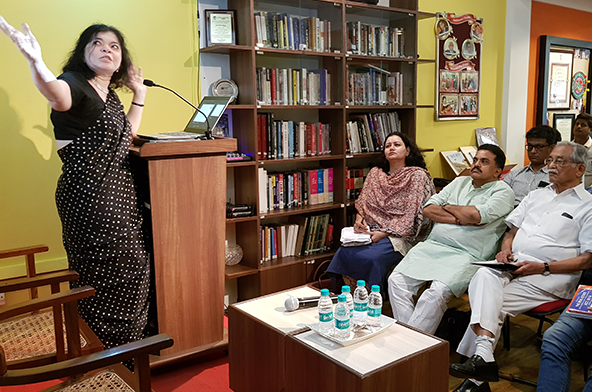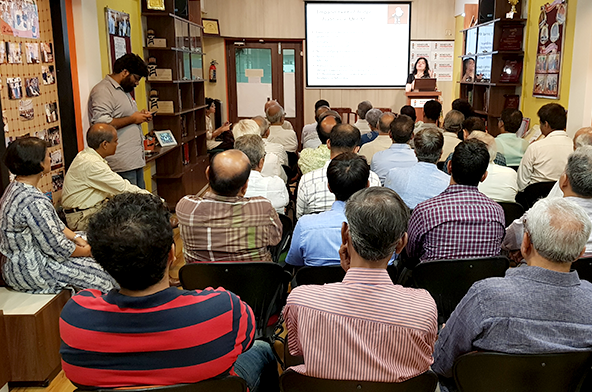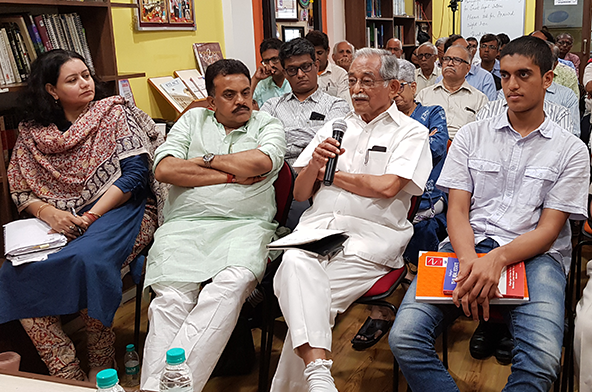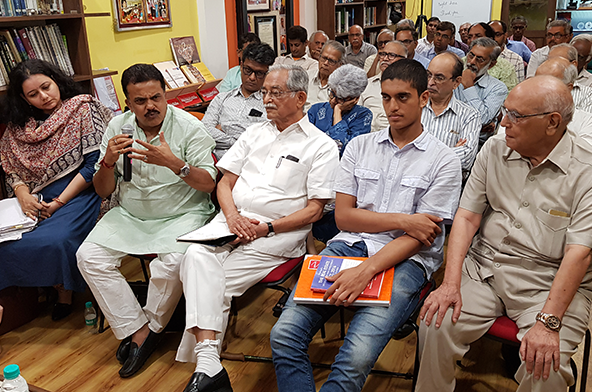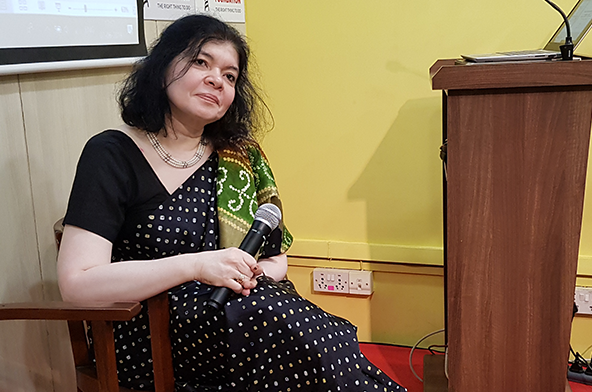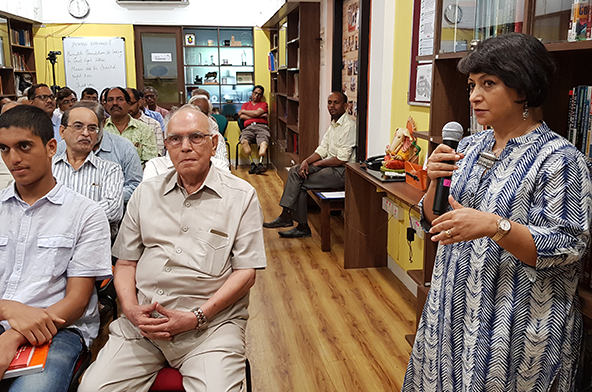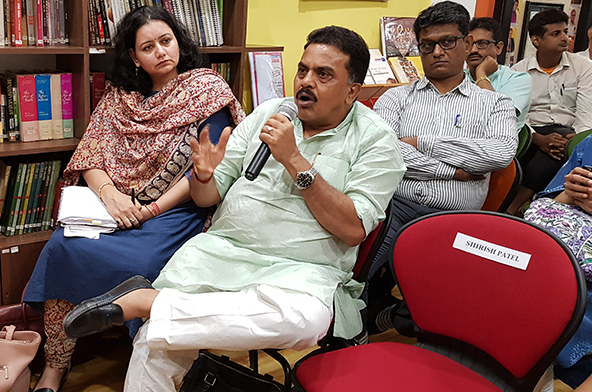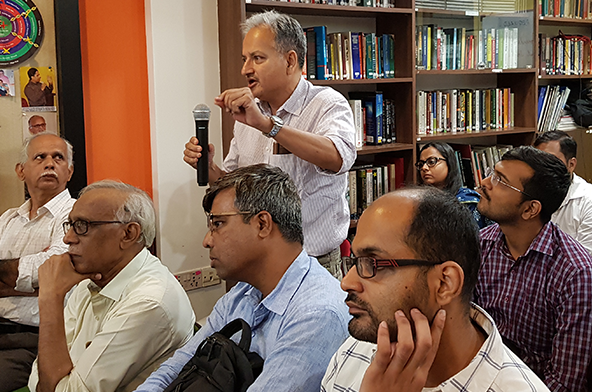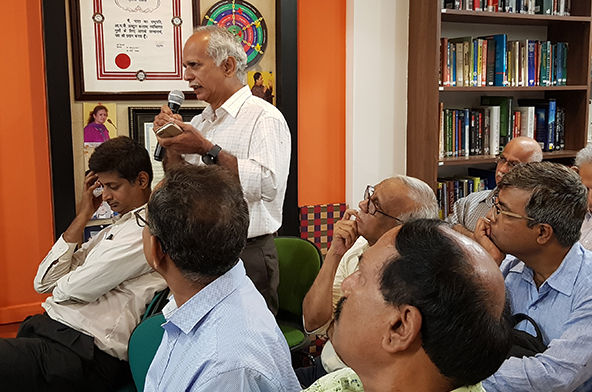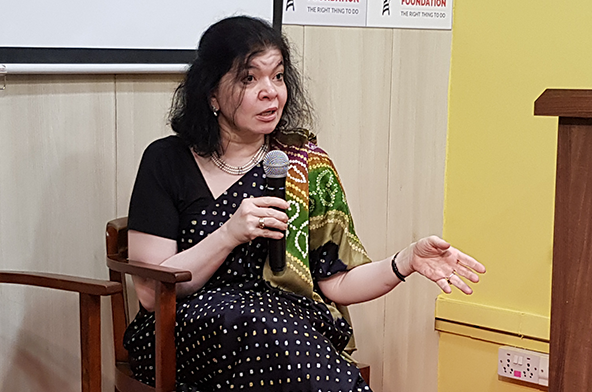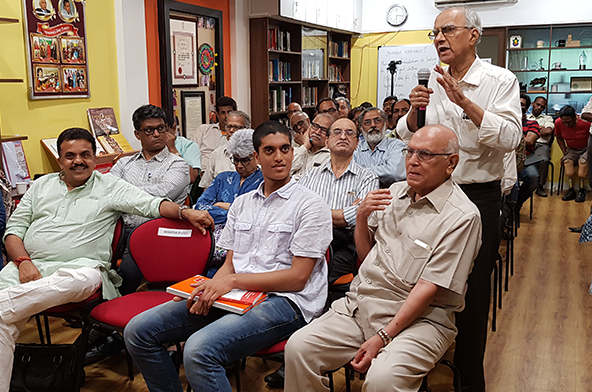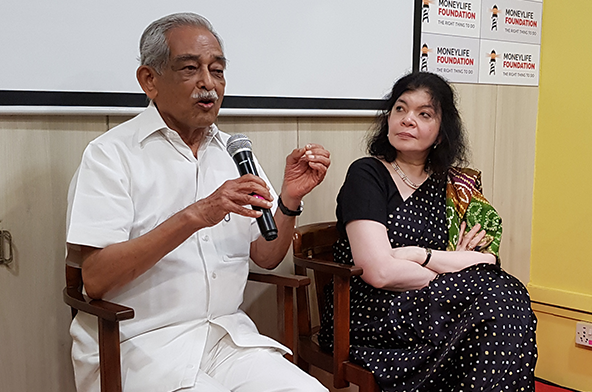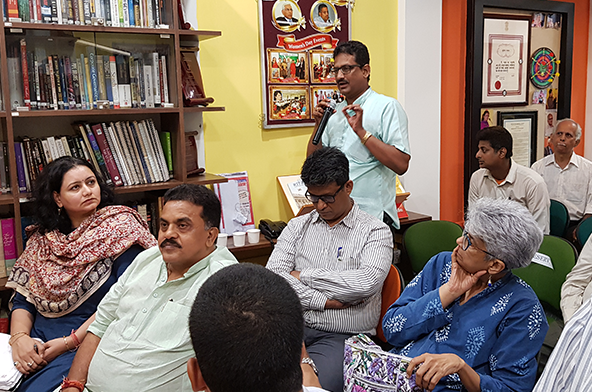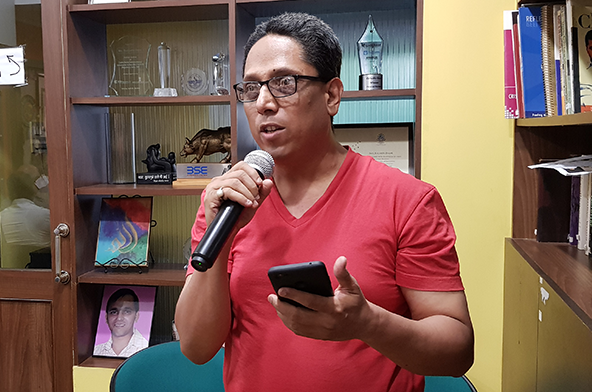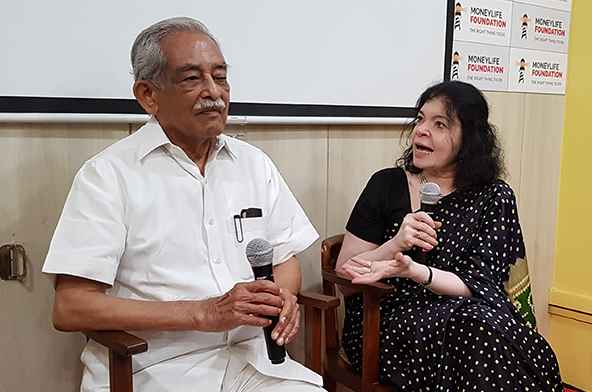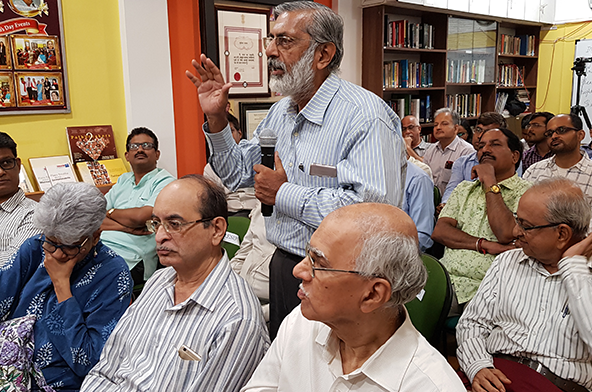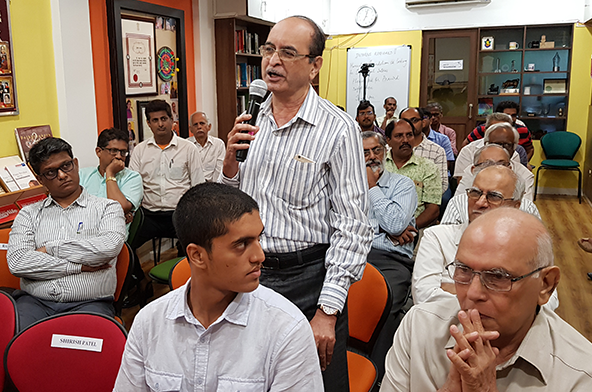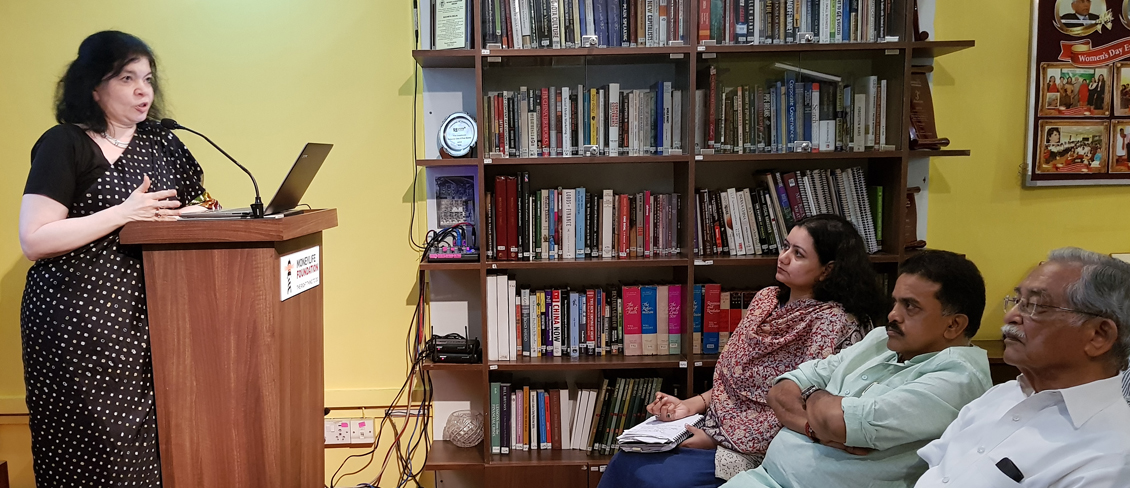
The monsoons are soon approaching and Mumbai is still far from being prepared for it, from roads being dug up for Metro construction work to bridges being shut for safety reasons. Recently a report was even published citing Mumbai as the worst City in the world in terms of traffic jams. What are we doing wrong and how can we change Mumbai for the better? To find out, Moneylife Foundation had invited Alpa Sheth, a highly qualified and respected structural engineer from VMS Consultants to inform us on the current status of Mumbai s urban infrastructure.
Elaborating on her idea of a fear-psychosis among government engineers and bureaucrats, Ms Sheth explained how every day there are new reports in newspapers reporting on another dangerous bridge closure.
There is no solution being offered and yet some consultant or auditor is telling us that a bridge cannot be repaired or is in bad shape and needs to be closed or demolished, she stated.
Furthermore, when the penalty for an engineer is to lose his/her job and pension, there is a certain amount of fear that is being spread. Ms Sheth is certain that his fear-psychosis is leading to poor unqualified decisions being made after the Andheri bridge collapsed in Mumbai.
The session was attended by experts such as Shirish Patel, senior consultant and civil engineer with experience in designing, managing and inspecting structural engineering projects, and current as well as retired employees of Railways and BMC. Sanjay Nirupam, former MP from Indian National Congress was also present for the talk and provided some valuable suggestions on the problems that Mumbaikars face today. The session was also attended by activists and concerned citizens of Mumbai.
Through her talk, Ms Sheth proposed possible solutions to the problem and it starts with stopping demolitions of bridges based on flimsy audit reports done by a single person. She reaffirms that there has to be a cadre of certified bridge audit engineers who have been trained with IRC manuals and codes. Furthermore, the training can be done by Indian Association of Bridge and Structural Engineers (IABSE), perhaps in collaboration with the Indian Academy of Highway Engineers. Instead of playing the blame game, everyone involved should take equal responsibility consultants including IIT professors, government engineers, contractors and more, she added.
According to Mr Nirupam, suggestions of having a national bridge database or a cadre of experts is fine, but it will take a lot of time. What is Mumbai to do in the meantime? They (BMC) have announced that 24 bridges out of 36 are dangerous and shut them down. Things are out of control. They don t know when they are starting with the repair work, when it will be completed, when it will open to the public nothing is clear, no one knows anything he said when asked about solutions to the problem Mumbai is facing.
Mr Patel, the renowned senior civil engineer feels that nothing will change unless there is a change in procurement of engineering services. He says, Right now, the way government procures engineering services is by inviting persons and offers with the lowest bid. Once you do that, consultants try to compete amongst themselves to put forward the lowest cost and they stop thinking about construction with the best quality in mind. This creates a problem where the parties being involved in inspection, auditing or construction of the bridge are not being rewarded for better quality but for better fees.
Even the topic of transparency within the administration was questioned when audit reports of bridges are not made public. There is no transparency. A good word that you (Ms Sheth) used is fear psychosis . People are afraid and with that fear, entire Mumbai is disturbed. Traffic jams all over the places and no alternate arrangements in place or solutions being offered. No one knows what is to be done, added Mr Nirupam.
Earlier in her presentation, Ms Sheth shared a list of some key bridges that have collapsed in the past while they were still under construction. Presenting the data for such bridge collapses in the past 20 years, she remarked Not only do we not know how to maintain bridges, we apparently don t know how to build and design bridges. She further explained that the some of these bridges that collapsed under construction were supervised by consultants indicating that the problem seems to stem from insufficient oversight.
Speaking about the current status of bridges in Mumbai, she stated that instead of worrying about the technical aspects of a particular bridge, i.e, their construction, design or whether it should be demolished, we should start looking at the psycho-technical part of the issue.
Citing an example of a bridge collapse in the past, she mentioned how a bridge designed by an IIT Roorkee team collapsed and how the perception has always been that our academic institutions can do no wrong in such matters. She is of the opinion that this public perception needs to change.
Comparing the situation of collapsing bridges in other countries around the globe, Ms Sheth mentioned that the problem is not limited to just developing countries it is, in fact, a larger problem in developed countries. In the US, there is a regular Infrastructure Report Card that is published by the American Society of Civil Engineers (ACSE) which includes a record and analysis of the status of bridges in the country.
Accordingly, their Report Card from 2017 states that around 10% of US bridges are structurally deficient and 4 out of 10 bridges are over 40 years old. There is a common misconception that because a bridge is over a certain number of years, it is unsafe and should be demolished. Ms Sheth insists that a proper inspection along with a review of peers is necessary in all cases regardless of the age of a particular bridge.
Talking about the situation of bridges in Mumbai and generally in India, she explained that there is a limited or poorly utilised maintenance budget, increased traffic on bridges, shortage of trained bridge inspectors and, finally, indifference within the administration. The reality on the ground is nobody knows the state of India s bridges, she added.
Although bridges are being audited around India, we (as in the administration) do not have a clear idea on what is to be expected. NK Sinha, former director general of roads in the ministry, was quoted saying, it is possible for one bridge inspector to audit a maximum of 200 meter long stretch of bridge inspection in a week.
On the other hand, we have railways minister Piyush Goyal, stating in response to the collapse of the Andheri bridge, A joint safety audit will be conducted by the Railways, the BMC and IIT-Bombay of the 445 ROBs, foot overbridges (FOBs) and bridges over the pipelines in Mumbai as part of effort to improve safety of commuters in the next six months.
None of the consultants empanelled (by the BMC) at the moment have any bridge design experience, including the faculty member of IIT Mumbai, who is tasked with auditing 445 bridges in Mumbai, said Ms Sheth on the process of selecting so-called expert auditors or consultants.
She suspects that BMC-empanelled structural engineers do not have any technical expertise or experience in bridge engineering and, in fact, have not even read the Bridge Inspector s manual published by the Indian Road Congress (IRC). None of these auditors ever undergo a bridge maintenance or audit course, nor are they familiar with IRC codes/circulars on bridge maintenance. She put forward a thought-provoking question: How can we entrust the important work of inspecting, maintaining and repairing the bridge to apparently unqualified local labourers and their supervisors?
But she made it clear that this is not entirely the fault of the reluctant bridge audit and municipal engineers. They may be inexperienced with the inspection work or may have little time to do so. Besides they are not required by law to maintain bridges. It may even be that maintenance log books are not regularly updated and have perhaps been filled with meaningless dummy text. We are not sure even if senior engineers verify the data that is collected about the structures by their subordinates.
In her presentation, Ms Sheth reaffirmed the need for a national database on bridges across the country, detailing the exact number and location of bridges along with the condition of each bridge. She believes that this will help identify the condition and plan maintenance programme for bridges. In fact, in 1996 there was an attempt to build such a database, but it failed as, having a complicated bridge management software is meaningless without an effective bridge management organisation with properly defined responsibilities and trained personnel who are not transferred on a regular basis . There has again been a half-hearted attempt in 2016 with Indian Bridge Management Systems (IBMS) which boasts of having inventorised 1,72,516 bridges.
But Ms Sheth is not readily willing to accept those numbers, since the data collection and sharing has been subcontracted to private consultants with no standard operating procedure. Can we be certain of the competency of the Data Collectors? She believes that the analysis done by IBMS contractors only considers in a 0 or 1 , i.e. either they are dangerously bad or they are not; there is no grey area in between. This way the database shows that only 20% of the bridges are in a really bad state, while the remaining 80% we do not have any qualitative data about. Furthermore, no government agency is willing to take ownership of the data and since there is no accountability the data has no intrinsic value.
Moving onto the topic of disaster management, Ms Sheth mentioned that the administration in no manner has taken account of what would happen if an earthquake or fire incident were to occur. Nobody has even considered that due to the number of roads being blocked with Metro construction, there is no clear path of exit during disasters or the economic loss that the city is experiencing. There is no official study at the moment on these aspects of Mumbai s infrastructure challenges.
A senior official from the Indian Railways who attended the event said, My colleagues in the Railways are over-burdened with track maintenance, and platform beautification and hardly get any time for proper practical training on the maintenance of bridges and FOBs.
On the other hand, a retired employee from BMC suggested that, Somebody has to be behind the engineer. That is the big issue. Nobody wants to take responsibility and the engineer takes the brunt of the blame. Even though they are qualified, the higher authorities do not have faith in the engineers.
Talking about the training of consultants and auditors, Ms Sheth said, We should not dumb down training. You need to have a historical type of lesson detailing all the different kinds of failures that have occurred in the past. Something like a Doctor, who only develops his/her diagnostic skills by handling several different patients over years? Learning and developing skills by practical means.
Nobody is taking ownership or thinking about leadership. There is a clear fear psychosis which spreads an incorrect message of bridges becoming unsafe overnight, said Ms Sheth.
After an hour of productive discussion, the activists, employees of Railways and BMC, as well as experts who were present at the event, mutually agreed that a common administrative group needs to be formed to oversee and take charge of all the infrastructure issues that the city is facing. There was also general consensus that the Municipal Commissioner will have to involved in this process and perhaps that is where the concerned citizens should make a beginning.


